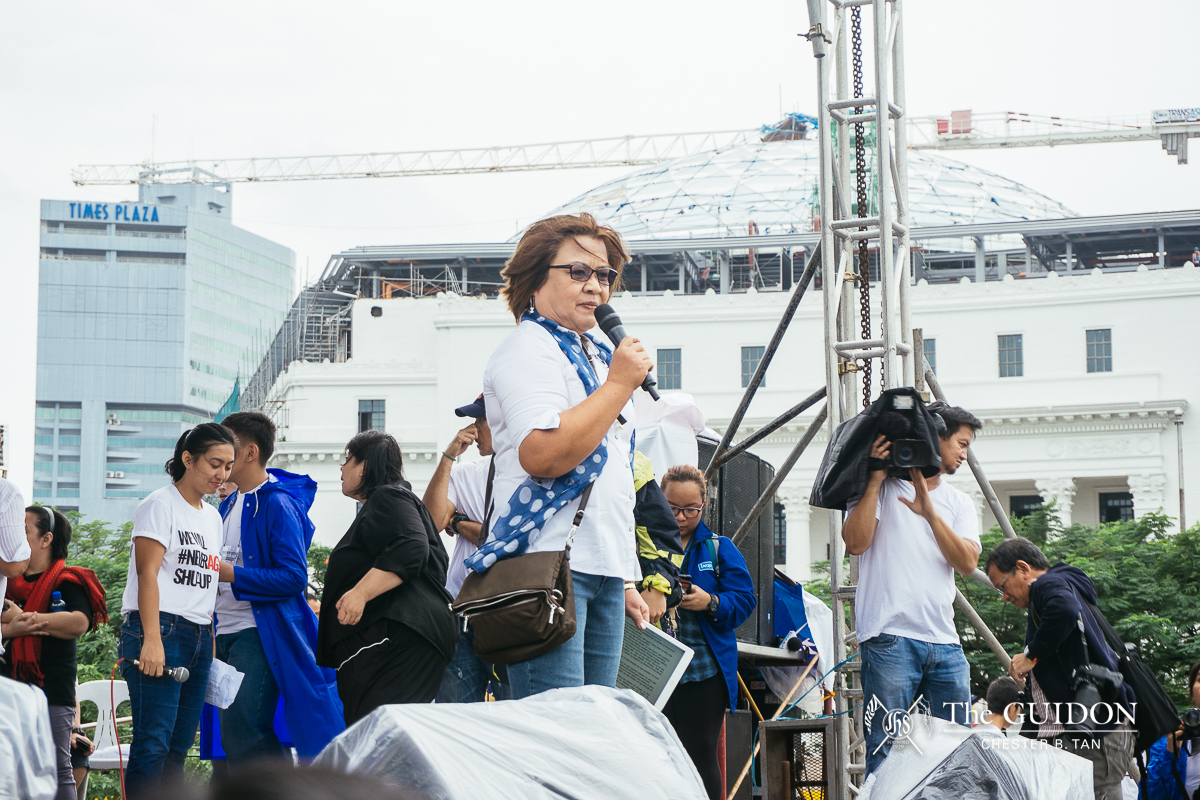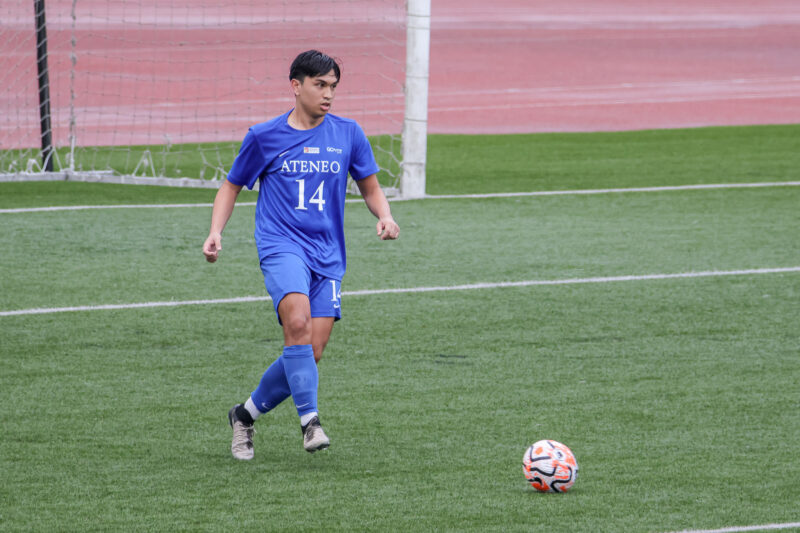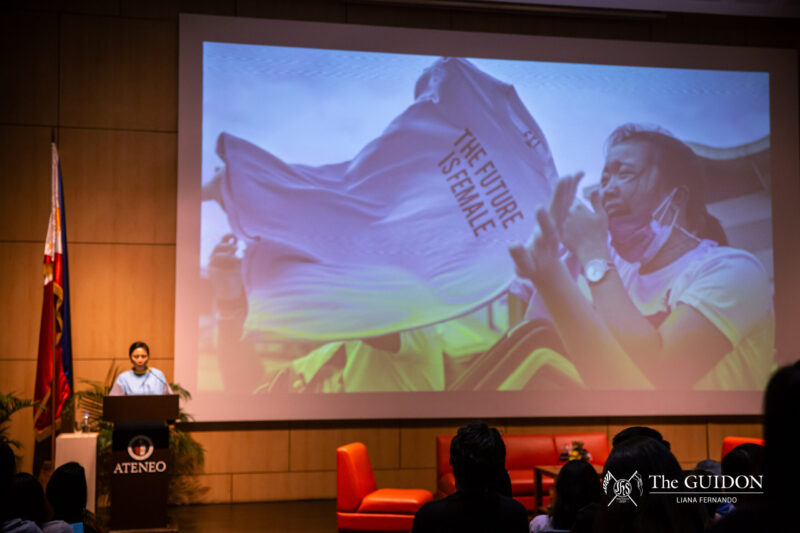A YEAR since her arrest over drug-related charges, Senator Leila De Lima remains locked away in the Philippine National Police (PNP) Custodial Center, Camp Crame.
The security compound holds the likes of high-profile drug personalities Parojinog siblings, and keeps its detainees and their visitors under constant surveillance.
De Lima enters the compound’s reception room, which is furnished with a single center table, couch, and two monobloc chairs. A television sits in the corner of the room, and serves as the only form of digital entertainment that those in the compound will come in contact with. All detainees spend their days in the absence of air conditioning.
The senator’s attention is divided during visiting hours, for she can only make use of the day’s time to see outsiders such as her staff and those who have set appointments with her. With legal documents tucked under her arm, she prepares for the day’s interview with The GUIDON.
“I see it as a blessing because I now have more time to reflect, to pray, to read—it is the beauty in solitude. I have more time on my own,” De Lima says of her detention.
Prior to her arrest, De Lima had openly voiced her criticism over extrajudicial killings linked to the Duterte administration’s “war on drugs” multiple times—securing a leading role in the opposition.
On February 24, 2017, the senator surrendered to the police after spending the night in the Senate. She was then brought to Muntinlupa Regional Trial Court, where she once more faced the judge who had ordered her arrest for violating Republic Act 9165 or the Comprehensive Dangerous Drugs Act of 2002.
The charge was based on allegations made during a House hearing by some high-level inmates at the New Bilibid Prison accusing De Lima of facilitating the drug trade inside the national penitentiary.
In exchange for their testimonies, the Department of Justice dismissed the drug cases of inmates Herbert Colanggo, Engelbert Durano, Vicente Sy, Jojo Baligad, and Peter Co.
While human rights groups such as Amnesty International tagged De Lima as a “prisoner of conscience” silenced by the administration for her criticisms, some considered her provocations as part of the senator’s political agenda.
“What is happening right now is she is really using this as her platform for her own politics,” says political science professor Aries Arugay, citing how De Lima had previously been taunting President Rodrigo Duterte to arrest her.
De Lima’s allies in the Liberal Party considered her arrest to be “illegal and unjust.”
In his dissenting opinion on the Supreme Court decision that kept De Lima in jail, Associate Justice Antonio Carpio questioned the lack of detail in the drug-related allegations.
“There was no specified seller, no specified buyer, no specified kind of dangerous drug, no specified quantity of dangerous drugs, no specified consideration, no specified delivery and no specified payment,” he wrote.
Despite these, the arrest was carried out. Presidential Legal Counsel Salvador Panelo even hailed the decision. “The majesty of the law shines triumphantly when a Senator of a Republic is arrested and detained on account of a criminal charge. Such is the working of a democracy.”
Now, De Lima lives her days continuing to do tasks as a member of the Senate, but in the absence of electronics and access to social media platforms.
Updates on the outside world come in the form of a single media and communications packet delivered by her staff during visiting hours.
Telecommunication is banned in her holding area, so the eight-hour visiting period is often used to accommodate fellow government officials and staff with matters to discuss with De Lima.
“It’s very hard because I’m fulfilling my mandate in a very limited capacity,” says the senator, adding that she has responsibilities that she would like to accomplish for the people.
Unable to leave her holding area nor call upon a proxy during legal measures, she files requests for Senate attendance in the midst of her detainment. Permission to physically attend the hearings, however, are still up to the discretion of the court, and have been opposed by the likes of Justice Secretary Vitaliano Aguirre.
As the sun sets past 5:00 PM, De Lima is no longer allowed to see visitors for the day and resorts to isolated interests such as reading books.
Head above water
Since her arrest, De Lima’s case has faced a number of challenges. In October 2017, the Supreme Court voted 9-6 to dismiss the senator’s petition seeking to nullify her arrest, leading her team to appeal for a motion of reconsideration a month later.
Earlier this month, Muntinlupa Regional Trial Court (RTC) Branch 203 Judge Myra Quiambao released a two-page order of inhibition from handling De Lima’s drug charges due to personal ties with some members of the prosecution panel. This move makes Quiambao the second judge to drop the opposition senator’s case after Muntinlupa RTC Branch 204 Judge Juanita Guerrero.
“I don’t have any illusion that I am going to attain justice sometime soon… it is a lost cause for me as long as my case is concerned,” she says.
For De Lima, it seems that the condition of her case is at a standstill and will remain as such in the near future, leaving her with the option to seek help from the International Criminal Court (ICC) as she continues to fight her battle against the administration.
“The time is ripe for international intervention via the ICC,” the detained senator says, though she knows that doing so will not be easy ambivalent in taking this step. For her, she still prefers to resolve her case “domestically.”
In an interview with CNN Philippines, University of Santo Tomas Faculty of Civil Law Dean Nilo Divina says, “[…] to elevate the [senator’s] case to the ICC, the president’s offense has to be ‘more than intrusion to one’s right to privacy, it has to be a crime against humanity.’”
Beyond Camp Crame
The ICC’s possible involvement is not limited to De Lima’s case, as the senator herself had mentioned the ineffectiveness of presidential immunity in the face of an ICC suit against Duterte on extrajudicial killings (EJKs).
“It’s systematic, it’s State-inspired, if not State-sponsored,” she previously said of EJKs at a forum in 2016.
The dormancy of her personal case allows her to continue to focus on matters that lie beyond the detainment facility.
For instance, the recent revocation of Rappler’s certificate of registration has furthered the senator’s belief in the administration’s attempts to silence the opposition.
“The pattern is very clear, it is oppression—this regime cannot stand dissent and opposition. They have been bastardizing the rule of law,” she says.
According to her, the actions taken against Rappler are signs of disrespect to institutional independence.
The detained senator points out that this could be part of a possible plan to extend the president’s term despite assurances from the Palace that there are no such moves. “Extending the term is their agenda! Authoritarianism, absolute power,” she says.
De Lima then asserts the role of the youth in the resistance. “The key actually are the millennials. The moment there is a sizable portion of the student population, their voices can be heard,” she says.
“We need more personalities also to be the frontrunners in the struggle for truth and decency in the country.”
For now, the future has yet to show what it holds for De Lima. She continues to follow up on Senate action in the aforementioned issues while on a waiting game for the resolution of her own case.
On the opposition
Admittedly, De Lima believes that it would be difficult to determine how to further their movement in a new manner. For now, she hopes in the opposition’s perseverance.
“The opposition must be consistent and determined to do what it can to counter these things, especially with the culture of ready acceptance of what is seen,” she says.
“They should not stop opposing those that should be opposed. Likewise, they should not stop educating those that should be educated.”
With the odds stacked against her, De Lima remains defiant. “I have a clear conscience, I have nothing to worry about. The Lord knows the truth.”




